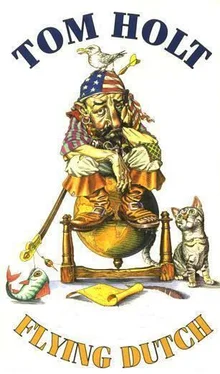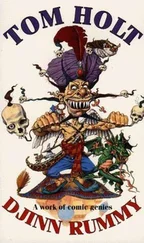Tom Holt - Flying Dutch
Здесь есть возможность читать онлайн «Tom Holt - Flying Dutch» весь текст электронной книги совершенно бесплатно (целиком полную версию без сокращений). В некоторых случаях можно слушать аудио, скачать через торрент в формате fb2 и присутствует краткое содержание. Год выпуска: 1991, Жанр: Фэнтези, Юмористическая проза, на английском языке. Описание произведения, (предисловие) а так же отзывы посетителей доступны на портале библиотеки ЛибКат.
- Название:Flying Dutch
- Автор:
- Жанр:
- Год:1991
- ISBN:нет данных
- Рейтинг книги:5 / 5. Голосов: 1
-
Избранное:Добавить в избранное
- Отзывы:
-
Ваша оценка:
- 100
- 1
- 2
- 3
- 4
- 5
Flying Dutch: краткое содержание, описание и аннотация
Предлагаем к чтению аннотацию, описание, краткое содержание или предисловие (зависит от того, что написал сам автор книги «Flying Dutch»). Если вы не нашли необходимую информацию о книге — напишите в комментариях, мы постараемся отыскать её.
Flying Dutch — читать онлайн бесплатно полную книгу (весь текст) целиком
Ниже представлен текст книги, разбитый по страницам. Система сохранения места последней прочитанной страницы, позволяет с удобством читать онлайн бесплатно книгу «Flying Dutch», без необходимости каждый раз заново искать на чём Вы остановились. Поставьте закладку, и сможете в любой момент перейти на страницу, на которой закончили чтение.
Интервал:
Закладка:
By the time Jane got to Lower Brickwood Farm Cottage—which is, of course, about as far from Lower Brickwood Farm as you can go without leaving the parish—it was nearly dark. The directions she had been given led her down an unmetalled road to a yard containing five fallen-down corrugated-iron sheds, which looked for all the world as if they were used for storing the proceeds of plundering expeditions against the neighbouring villages. There were in addition a spectacular collection of damaged tractor tyres, a burnt-out Ford Anglia with a small tree growing through the windscreen, several discarded items of farm machinery and a derelict stone structure of great age.
Jane would probably have given up at this point, for she was unused to such scenes; but she saw a crudely-painted sign on the derelict stone structure which said “Lower Brickwood Farm Cottage” and decided that this must be it. She walked up to the door and, being a well-brought-up young lady, knocked. A voice in the back of her mind called her an idiot, and she tried the door instead.
It wasn’t locked; indeed, it gave a couple of inches before coming to rest against something low and heavy and thereafter becoming immovable. It has previously been recorded that the book Jane Doland had been reading before she came to Bridport was a detective story, and it should be noted that Jane was a devotee of this genre of fiction. In many detective stories, the detective tries the door of the lonely house to find it open but obstructed in precisely this way. The obstruction, you can bet your sweet life, will invariably turn out to be a dead body.
The last thing Jane wanted to find was a dead body. However, the same inner voice that had called her an idiot only moments before urged her to push against the door, and when she did it opened. There was no dead body. Instead, there was a heavy snowdrift of envelopes, most of them extremely mouldy. Some of them had stamps with the head of Queen Victoria on them. All of them had come from the National Lombard Bank. Jane knelt down on a century’s worth of bank statements, invitations to take out credit cards, insurance company mail-shots and encomia of National Lombard Unit Trusts, and searched her handbag for her torch.
A brief torchlight survey produced evidence that Lower Brickwood Farm Cottage had not been inhabited for many, many years by anything except small animals and birds. It was extremely unpleasant, and Jane found herself thanking Providence that she had been born with virtually no sense of smell. She picked her way tentatively across the floor to the middle of the one room that occupied the ground floor and peered round. She saw that the staircase had long since collapsed, along with large portions of the ceiling. She decided that it probably wasn’t terribly safe in there.
Just as she was about to leave, she saw a small tea-chest. It too contained envelopes. Having come this far and found so little, Jane made up her mind to investigate these. With extreme distaste, she fished out a handful of them and looked at them in the torchlight. They were all addressed to J Vanderdecker, and they contained invoices.
Whoever J Vanderdecker was, he had been a good customer of Jeanes’ boatyard for a very long time. Each invoice was marked “Paid with thanks” and related to some sort of repair done to a ship. A wooden ship, evidently; many references to tar, nails, boards, ropes, lines, sailcloth, as well as a mass of nautical technical terms which Jane did not pretend to understand. The earliest invoice, which was so sodden with damp and rot that it fell to pieces in her hand, was dated 1704. The most recent one was exactly two years old. By the time her torch battery died on her, Jane had traced the invoices back in an unbroken line, from the present day to the reign of Queen Anne, at twenty-one year intervals.
Jane fumbled about in the dark looking for the door, and eventually she found it. No the front door, with all the dead bank statements; the back door, which was also unlocked. Jane suddenly felt very nervous; something was going on, and from the facts she had at her command it looked as if it was something highly peculiar. Peculiar things, her common sense told her, are usually illegal. Perhaps she didn’t want to know any more after all. Perhaps she should forget all about it and go back to London.
One thing was definite, and that was that she needed a drink, quickly. From what she had seen of it, the Green Man was fractionally less unpleasant than the snake-pit in a Harrison Ford adventure movie, but it was close and the landlord might tell her something else about Lower Brickwood Farm Cottage. She went there.
“So they’re selling the cottage, are they?” said the landlord. “They’ll be lucky.”
The pub was virtually empty, and Jane wondered how the landlord made a living out of it. She looked at him and decided that he probably did a little body-snatching on the side.
“Oh yes?” she said. “Why not?”
The landlord looked at her. “Haven’t you been up there, then?” he asked.
“Yes,” Jane said, “just now. But even if the building’s all fallen down, the site must be worth something, surely.”
The landlord looked at her again, and Jane started to feel uncomfortable. “You sure you went there?” he said.
Jane described what she had seen, leaving nothing out except the bank statements and the invoices. “Is that the place you mean?”
“You didn’t notice the smell?”
Jane explained that she had a truly abysmal sense of smell. The landlord burst out laughing. When, after a long time, he regained a semblance of coherence, he explained. He said that the place had been deserted for as long as everyone could remember because of the worst smell in the entire world. The story went that a foreigner with a funny name had rented it for a week or so, years and years back, before anyone now in the village had been born, and that ever since he left nobody had been able to stay more than ten minutes in the place, because of the smell. Everything had been tried to get rid of it, but it persisted. An attempt to use it as a pigsty had failed when all the pigs died. After being on the books of Messrs Pardoes for fifty-two years it had been taken off the market and forgotten about.
“Didn’t they tell you that, then?” he concluded.
“No,” Jane said, “they didn’t mention it.”
“And you, not being able to smell, you didn’t notice it.”
“That’s right.”
“Well,” said the landlord, “if that doesn’t beat cock-fighting. That’ll be a pound five, for the gin and tonic.”
Jane drove back to Union Hotel and went to bed. She didn’t feel the lack of something to read. She was too preoccupied with thinking.
THREE
The slight misunderstanding concerning the legend of the Flying Dutchman came about like this.
In the summer of 1839, a young German musician was sitting in a café in Paris drinking armagnac and thinking uncharitable thoughts about the regime of King Louis Philippe. It was a hot day, armagnac is by no means non-alcoholic, and the German was fiercely Republican by temperament, so it was perhaps understandable that the intensity of his reaction to the crimes against freedom that were going on all around him led him to speak his thoughts out loud. Before he knew what he was doing he was discussing them with the man sitting at the next table.
“Kings,” said the young German, “are an anachronistic obscenity. Mankind will never be truly free until the last king’s head is impaled on the battlements of his own palace.”
If the young German had bothered to look closely at the stranger (which of course he didn’t) he would have seen a neatly-dressed weather-beaten man of absolutely average height and build, who could have been any age between a gnarled twenty-nine and a boyish forty. There was just a hint of grey in his short beard, and his eyes were as sharp as paper can be when you lick the gum on an envelope. He considered the German’s statement seriously, wiped a little foam off his moustache and replied that in his experience, for what it was worth, most kings were no worse than a visit to the dentist. The young German scowled at him.
Читать дальшеИнтервал:
Закладка:
Похожие книги на «Flying Dutch»
Представляем Вашему вниманию похожие книги на «Flying Dutch» списком для выбора. Мы отобрали схожую по названию и смыслу литературу в надежде предоставить читателям больше вариантов отыскать новые, интересные, ещё непрочитанные произведения.
Обсуждение, отзывы о книге «Flying Dutch» и просто собственные мнения читателей. Оставьте ваши комментарии, напишите, что Вы думаете о произведении, его смысле или главных героях. Укажите что конкретно понравилось, а что нет, и почему Вы так считаете.



![Brian Jacques - [Flying Dutchman 01] - Castaways of the Flying Dutchman](/books/128851/brian-jacques-flying-dutchman-01-thumb.webp)








